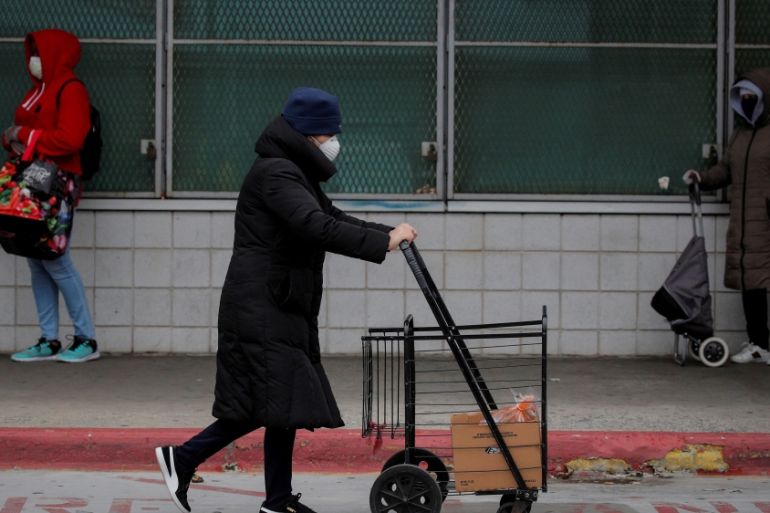US Markets fall: Dow drops more than 600 points
Amazon and Apple’s anticipated coronavirus-related trouble weighed down US indices

Wall Street sold off sharply on Friday after President Donald Trump revived a threat of new tariffs against China in response to the COVID-19 pandemic, which has brought global economies to a grinding halt. All three major United States stock averages closed down well over 2 percent, and for the week they all lost ground.
The Dow Jones Industrial Average fell 2.55 percent to end the day at 23,723.69. The S&P 500 – a proxy for the health of US retirement and college savings accounts – lost 2.81 percent, to 2,830.71. The tech-heavy Nasdaq Composite dropped 3.2 percent to close at 8,604.95.
Keep reading
list of 3 itemsUS jobless claims top 30 million in wake of virus lockdowns
Millions of Americans still can’t access jobless benefits: survey
More:
The S&P 500 just closed out its best month since 1987 in April, as trillions of dollars in monetary and fiscal stimulus helped lift stocks up from the lows plumed in March, as coronavirus lockdowns swept the nation.
But epically awful economic data, Trump’s renewed threats to punish China with tariffs, and warnings from corporate America of coronavirus-related profit hits ahead dragged on investor sentiment.
The Institute for Supply Management (ISM) said on Friday its index of national factory activity dropped to a reading of 41.5 last month from 49.1 in March. That was the lowest level since April 2009, just a few months before the Great Recession ended. A reading below 50 indicates contraction in the manufacturing sector, which accounts for 11 percent of the US economy.
The downturn in major stocks indexes capped a week of dismal data that showed the US economy shrank in the first three months of the year, more than 30 million Americans filed for unemployment benefits in six weeks ending April 25, and consumer spending – which accounts for two-thirds of US economic activity -collapsed in March.
“It is becoming increasingly difficult to ignore the growing disconnect between the stock market, which has just enjoyed one of its best months in decades, and the incoming economic data, which have continued to crater,” Neil Shearing, chief economist at Capital Economics, wrote in a note on Friday.
It is possible to reconcile the gap in what is happening on Wall Street and Main Street, Shearing wrote. But that can only happen if economic activity starts to recover in the second half of this year and central banks continue their huge policy support.
“The main risks at this stage are that the lifting of lockdowns are either delayed or ultimately reversed or that central banks are too timid or pull support too early,” he added.
Shares of Tesla Inc tumbled 9 percent on Friday after Chief Executive Officer Elon Musk tweeted that the electric carmaker’s high-flying stock was overly expensive.
U.S. manufacturing activity plunged to an 11-year low in April as the novel coronavirus wreaked havoc on supply chains, supporting analysts’ views the economy was sinking deeper into recession.